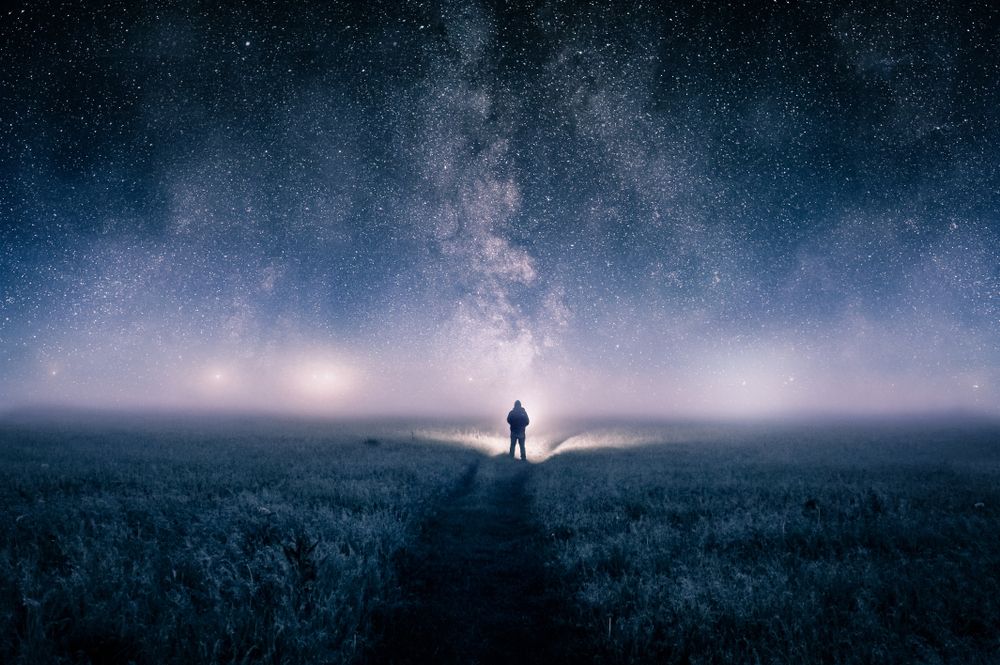Fort Fun Indiana
Diamond Member
- Mar 10, 2017
- 110,236
- 99,369
- 3,645
I believe the Moon is next. Then Mars.Well, tell me where NASA is going to send humans next? Are they going to stay for over a week? Nope.
Follow along with the video below to see how to install our site as a web app on your home screen.
Note: This feature may not be available in some browsers.
I believe the Moon is next. Then Mars.Well, tell me where NASA is going to send humans next? Are they going to stay for over a week? Nope.
One of the stupidest articles ever written by an evolved monkeyWe may be utterly alone in the universe.

Humans May Be the Only Intelligent Life in the Universe, If Evolution Has Anything to Say
We may be utterly alone in the universe.www.livescience.com
There's life on EuropaTo support life, a planet must maintain a certain temperature range, have water and a somewhat stable climate
Those planets are few and far between
Most planets with life are more likely to have some sort of slime than intelligent life
Unfortunately statistics doesn't produce life.
Life was created by a series of events that are so complicated that we can't replicate them in a laboratory.
We are biased because we live where life was created so of course we think it is a common occurrence. However, it may be that it has never happened before.
This video explains it much better than I could.
Well, tell me where NASA is going to send humans next? Are they going to stay for over a week? Nope.
I was right < 7 days -- NASA scientists reveal how long astronauts will stay on the Moon for Artemis mission.I believe the Moon is next. Then Mars.
Yes, just a visit.I was right < 7 days -- NASA scientists reveal how long astronauts will stay on the Moon for Artemis mission.
Like many thought experiments regarding evolution, this one starts in the middle, and not at the beginning.^ Are we alone in the universe? It comes down to whether intelligence is a probable outcome of natural selection, or an improbable fluke. By definition, probable events occur frequently, improbable events occur rarely — or once. Our evolutionary history shows that many key adaptations — not just intelligence, but complex animals, complex cells, photosynthesis, and life itself — were unique, one-off events, and therefore highly improbable. Our evolution may have been like winning the lottery … only far less likely.
Did you watch the whole video?Don't believe a word of it
By evolution, probably not. That makes you one of the smartest beings - in the Whole Universe!"Life was created by a series of events that are so complicated that we can't replicate them in a laboratory."
So what? We can't create stars or volcanos in a laboratory, either.
Nobody is asking, "Can we create life in a labratory?"
We are asking if it has evolved at least twice in the 13.7 billion tears history of the universe.
Let's clarify this.By evolution, probably not.
Did you watch the whole video?
What don't you believe?
Did you know that there is a name for this fallacy? Like, you aren't the first one to come up with it... and it was explained away long ago?The odds of simply randomly shuffling a deck of 52 cards the same way twice is physically impossible.
Let's clarify this.
"Evolution" is what happens after life is already formed. But I get your point.
You mean, abiogenesis. And to be even more clear, you mean abiogenesis arising merely from selection and chemicals.
So you say abiogenesis has to be magical. Gotta grab some dirt and make a man? Like that?
Or... what?
No, it isn't! Trying to think of the whole of it will render you a drooling idiot, but that goes for anything with huge numbers and complex physics and chemistry at work.It's literally beyond me as a logical person.
I am a Christian that believes that God created the heavens and earth.I don't believe Evolution. At all.
The odds of simply randomly shuffling a deck of 52 cards the same way twice is physically impossible. Evolution supposes that not 52, but thousands of random molecules randomly formed thousands of proteins to randomly form the first cells which have since randomly evolved to make Fort Fun Indiana one of the most intelligent being in the whole Universe. It's not a dig at Fort, it's just reminding you that you might not have this right
No, it isn't! Trying to think of the whole of it will render you a drooling idiot, but that goes for anything with huge numbers and complex physics and chemistry at work.
So, you break it down to looking at how smaller structures formed. Even pre-life. Like, cell membranes. In the most basic form, they are stacks of lipids with a hydrophilic end and a hydrophilic end.
These lipids bump into one another and stick together. The structure may curve, depending on the lipids and how they bond. In that case, a "bubble" of this lipid membrane would be formed. And voila, a primeval cell membrane prototype is formed.
Indeed. But that could mean a different type of life elsewhere, no? It's pretty hard to define life.If the universe is finite then there will be unique things in it. Life on earth may be unique.
No, see, that's where you stray from the path. They didn't evolve "perfectly". The systems may have evolved other ways. And did, when you look at two animals. Which is perfect? The bladder lung of a Gar, or the lungs of a lungfish?You need to take that further. It's not just one time lump of a membrane, you need ALL of the basic functions to "evolve" perfectly together AND have an ability to replicate.